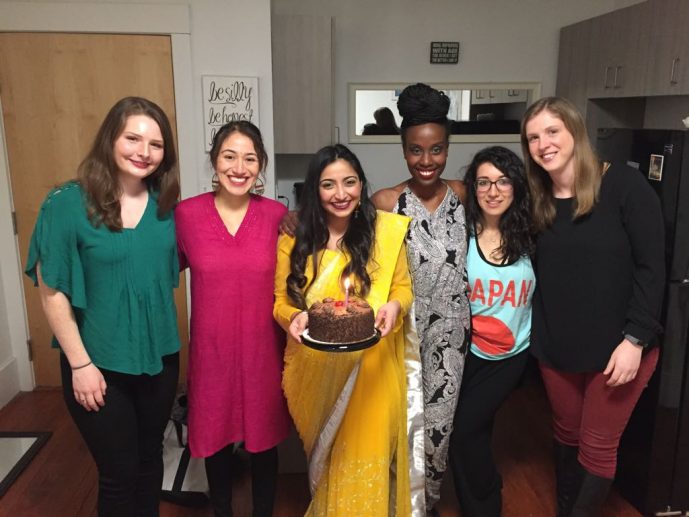Mariya’s Annotated Curriculum
Continuing to shine a light on the academic experiences of our graduating Student Stories writers, today we’ll look at Mariya‘s Annotated Curriculum.
Pre-Fletcher Experience
I worked as business analyst for Liberty Mutual Insurance in Boston (two years) and taught English in Antalya, Turkey through the Fulbright English Teaching Assistantship (one year).
Fields of Study
International Security Studies
International Business Relations
Global Maritime Affairs (self-designed)
Capstone Topic
Destruction of Cultural Property During Armed Conflict in Bosnia & Armenia
Post-Fletcher Professional Goals
U.S. Foreign Service
Curriculum Overview
Semester One
The Role of Force in International Politics
International Organizations
Petroleum in the Global Economy
The Arts of Communication
EPIIC Colloquium
Activities:
Fletcher Islamic Society; Fletcher Students of Color & Allies; Fletcher Arctic; Improv Group
 Directly before coming to Fletcher, I was teaching English at a Turkish University. Being in a school setting made my transition to graduate school easier, but I grossly underestimated the rigor of the Fletcher curriculum. In fact, I was not sure what to expect and I certainly did not know what to study, given my wide interests. My conversation with Mary Dulatre, F12, the friendly Fletcher Registrar and alumna, gave me comfort. She helped me decide on two of Fletcher’s most popular classes, the Role of Force (RoF) taught by Professor Richard Shultz and International Organizations (IO) taught by Professor Ian Johnstone, which gave me a foundational introduction to international relations and international law, respectively. As the core requirement for International Security Studies, RoF piqued my interest in the security field and pushed me to seek Professor Shultz as my thesis advisor. Petroleum in the Global Economy helped me understand the important role of oil in world affairs while the Arts of Communication sharpened my public speaking skills. As an ambitious first-year, I also decided to take the EPIIC Colloquium course offered by the Institute of Global Leadership, bringing my course load to 4.5 credits.
Directly before coming to Fletcher, I was teaching English at a Turkish University. Being in a school setting made my transition to graduate school easier, but I grossly underestimated the rigor of the Fletcher curriculum. In fact, I was not sure what to expect and I certainly did not know what to study, given my wide interests. My conversation with Mary Dulatre, F12, the friendly Fletcher Registrar and alumna, gave me comfort. She helped me decide on two of Fletcher’s most popular classes, the Role of Force (RoF) taught by Professor Richard Shultz and International Organizations (IO) taught by Professor Ian Johnstone, which gave me a foundational introduction to international relations and international law, respectively. As the core requirement for International Security Studies, RoF piqued my interest in the security field and pushed me to seek Professor Shultz as my thesis advisor. Petroleum in the Global Economy helped me understand the important role of oil in world affairs while the Arts of Communication sharpened my public speaking skills. As an ambitious first-year, I also decided to take the EPIIC Colloquium course offered by the Institute of Global Leadership, bringing my course load to 4.5 credits.
Semester Two
Global Maritime Affairs
Maritime Security (1/2 credit)
Selected Issues in Law of the Sea (1/2 credit)
Civil Resistance: Global Implications of Nonviolent Struggles for Rights & Accountability (1/2 credit)
Leadership and Ethics in American Foreign Policy (at Harvard Kennedy School (HKS))
Democracy, the Incomplete Experiment (at Harvard Law School)
Economic Problems of Latin America (Certified Audit)
Current Topics in International Relations (1/2 credit, Unofficial Audit)
Activities:
Fletcher Islamic Society; Fletcher Students of Color & Allies; Fletcher Arctic Conference VI; Tufts Energy Conference; TA, “Law of the Sea” at Fletcher (Professor John Burgess)
My second semester was by far my busiest and most enjoyable. I took four modules (half-credit courses), two regular classes, a certified audit, and — believe it or not — an unofficial audit. After attending the Arctic Circle Conference in Iceland in October 2016 with the Fletcher Maritime Program, I became extremely interested in water studies. Under the supervision of Professor Rockford Weitz, I decided to self-design a field of study in Global Maritime Affairs. I have enjoyed learning about the role of water in international trade, security, law, human rights, and communication; water essentially touches everything. I also enjoyed my classes at Harvard. At the Kennedy School, I took Leadership and Ethics in American Foreign Policy, taught by Professor Joseph Nye. A paper I wrote for his class examining the role of morality in three presidential legacies was published in the newly-launched student section of The Fletcher Forum of World Affairs. Similarly, I loved taking a course on American democracy at the Harvard Law School, where we explored topics such as immigration, religion, media, and elections. The timing of the course was impeccable, given the American political climate at the time. Inspired by the topic of religion in American politics, my classmate and I wrote an opinion piece criticizing the “Muslim Ban” that was later published in the Kennedy School Review.
Lastly, when I learned that Professor Monica Toft, the head of the Center for Strategic Studies, would be teaching a course on current topics in IR, I simply could not resist. Luckily for me, the timing worked out and I was able to squeeze the module in my schedule. Although I did not receive credit for the course, I thoroughly enjoyed completing all readings and assignments for the seminar. In fact, the memo on Turkey’s relationship with NATO I wrote as a final exam was published in the Harvard Journal for Middle Eastern Politics & Policy, where I am now a regional editor and regular contributor. Although this semester was the most rigorous, it really gave me the opportunity to explore a wide range of academic interests. My coursework this semester exemplifies the flexibility of a Fletcher curriculum.
Summer Internship
Mosaic Taiwan Fellowship (two weeks)
U.S. Embassy Bangkok, Public Affairs Section (10 weeks)
Semester Three
Foundations in Financial Accounting and Corporate Finance
Global Investment Management
National Security Decision-Making: Theory and Practice
Contemporary Issues in U.S.-Russian Relations
Processes of International Negotiation (Certified Audit)
Activities:
CFA Challenge; Women in International Security; Editor, Fletcher Forum of World Affairs; Editor, Harvard Journal for Middle Eastern Politics & Policy; TA,“Peace Through Entrepreneurship” at Tufts University (Professor Steven Koltai, F78)
Whereas semester two kept me happily busy, semester three challenged me in more ways than one. My course load was quite hefty and I experienced some personal life setbacks. Corporate Finance, the core requirement for the International Business Relations field, is perhaps the hardest class I have taken at Fletcher. In addition to class time, we were required to attend review sessions, complete individual problem sets, and prepare case studies in groups. Professor Laurent Jacque has taught this course to generations of Fletcher students and, looking back, it’s among the classes from which I gained the most practical knowledge. Although I do not plan to become a private equity analyst anytime soon, it was also useful to learn about strategic investments and product portfolio management in the Global Investment Management course. In contrast, National Security Decision-Making and U.S.-Russia Relations classes were very relevant to my anticipated diplomatic career. Both courses gave me a better understanding of history, lessons learned, and techniques to move forward given contemporary challenges. Another useful course for my career was International Negotiation, which allowed us to practice our negotiation skills during in-class simulations.
Semester Four
Lobbying: Theory, Practice, and Simulations (1/2 credit, January term at HKS)
Econometrics
International Financial Management
Innovation Field Lab: Public Problem Solving in Massachusetts Cities (at HKS)
U.S.-European Relations Since the Fall of the Berlin Wall
International Criminal Justice (Certified Audit)
Power in World Politics (Unofficial Audit)
Activities:
CFA Challenge (Americas Regionals); Women in International Security; Fletcher Arctic Conference VII; Editor, Fletcher Forum of World Affairs; Editor, Harvard Journal for Middle Eastern Politics & Policy; TA, “Public Opinion & Foreign Policy” at Tufts University (Richard Eichenberg)
 Selecting courses for my final semester was one of the hardest things I have done at Fletcher. I went back and forth on a number of classes; in fact, curating my schedule was such a conundrum that I did not finalize it until the add/drop deadline. My econometrics course, which I am taking to fulfill my EIB requirement, is a very practical one, as it teaches us how to build good research models and be critical of quantitative methodologies; but I wish I had taken it in my first year so that I could have applied those skills in research for my capstone. Advice to prospective students and first years: do NOT save your core requirements until the last semester!
Selecting courses for my final semester was one of the hardest things I have done at Fletcher. I went back and forth on a number of classes; in fact, curating my schedule was such a conundrum that I did not finalize it until the add/drop deadline. My econometrics course, which I am taking to fulfill my EIB requirement, is a very practical one, as it teaches us how to build good research models and be critical of quantitative methodologies; but I wish I had taken it in my first year so that I could have applied those skills in research for my capstone. Advice to prospective students and first years: do NOT save your core requirements until the last semester!
I decided to take International Financial Management to top off my International Business Relations field of study and also because I think it will be useful for my future career in understanding world markets. To switch up my quantitative course load, I decided to take Innovation Field Lab at HKS, co-taught by the mayor of Somerville Joe Curtatone. It’s a unique course in that students act as consultants for city governments to help them solve public challenges. My team, for example, is working with the City of Lawrence to help the government manage and resolve distressed properties through discovery, design, and delivery. Last but not least, the U.S.-EU Relations course, as well as my two audits, directly contribute to my professional training at Fletcher.
Looking back, it’s been an exciting yet humbling journey. I never imagined I would be able to accomplish this much when I first arrived in Medford. But it’s true what they say: never say never. I guess the journey continues…
Thank you, Ilyas! I’ll make sure Mariya sees your comment.
Amazing and thoughtful blog written by Mariya .l really enjoyed it when I read the all blog. Keep on going forward.